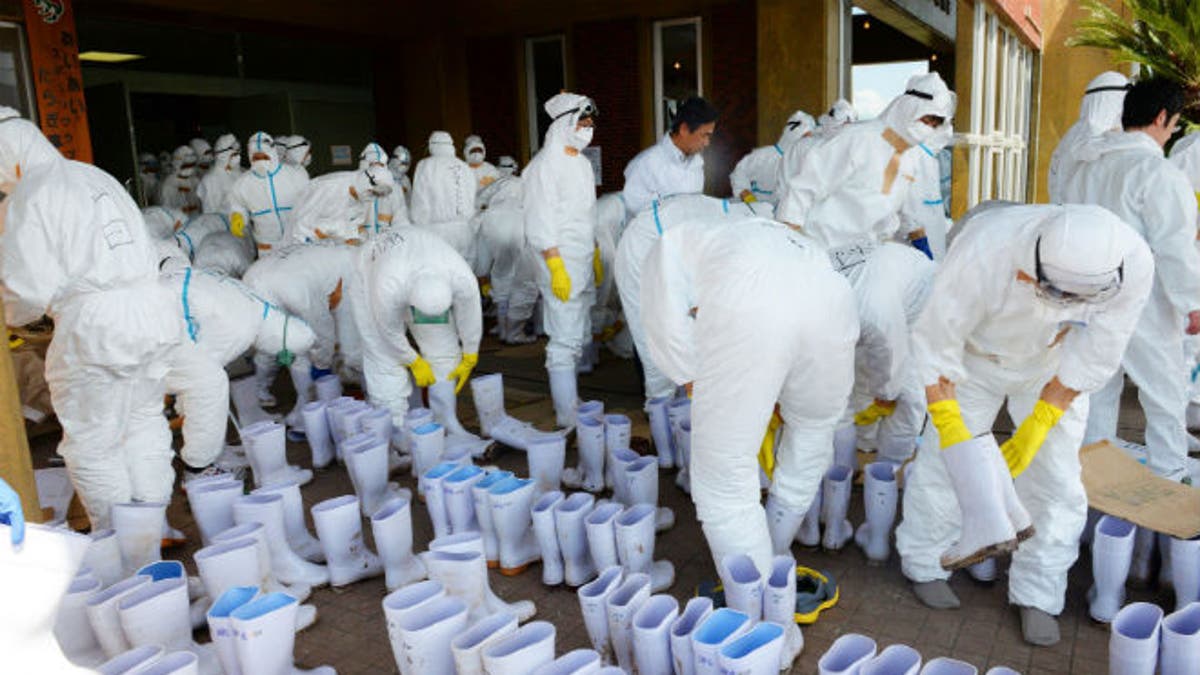
Prefectural government employees wearing protective suits put on boots to cull chickens in Taragi town, Kumamoto prefecture, in this photo taken April 14, 2014. (REUTERS/Kyodo)
Researchers from Harvard and Yale spoke out against animal research into avian flu, saying these experiments put the public’s health at unnecessary risk, USA Today reported.
In an article published in PLOS Medicine, epidemiologists Marc Lipsitch and Alison P. Galvani wrote against research that makes virulent avian flu strains more transmissible among mammals, notably studies that have created novel strains of avian flu in ferrets. While this research is intended to improve surveillance methods and vaccine design, the authors believe the risk of an accidental virus outbreak is too great.
"There really are a lot of things we can and are doing that are much more likely to yield benefits and also don't put anyone at risk," Lipsitch, a professor of epidemiology at the Harvard School of Public Health, told USA Today. "We should support safe and effective research rather than risky research.”
In the opinion piece, Lipsitch noted that, while individual errors in any year or lab are very rare, the risks add up over time. Following current security precautions, if 10 laboratories conducted bird flu research, there would be a 20 percent chance of the virus infecting a lab worker and a 1 percent chance of the virus escaping the lab within 10 years, the researchers said.
The H5N1 bird flu, which is routinely found in wild birds and sometimes poultry, jumps to people after direct contact with infected or dead poultry. There have been 650 human cases of H5N1 reported in 15 countries since 2003 – and more than half of the cases were fatal.
Some researchers who study bird flu disagree with Lipsitch’s opinion, saying the approach is necessary to understanding the flu. Work with ferrets has shown that H5N1 could cause widespread illness, and countries should be stockpiling vaccines against it, according to Yoshihiro Kawaoka, a virologist at the University of Wisconsin-Madison and at the University of Tokyo.
"This is a critical point since vaccines expire, and decisions by policymakers as to whether we continue to stockpile H5N1 vaccines should be based on scientific facts," Kawaoka told USA Today. "Thus, human populations have already benefited from the H5N1 ferret transmission experiments."
While Kawaoka and his colleagues are doing careful work, Lipsitch is correct to note that not all researchers are as meticulous, said Wendy Barclay, a virologist at Imperial College in London.
"Even in the Western world, standards of health and safety are not uniform," she told USA Today. Barclay suggested that global standards may be needed to control research looking into potentially dangerous viruses.
However, she concluded that people should not be worried about research projects.
“I would not suggest that living next door to one of these labs increases your risk in any sense,” Barclay said.
